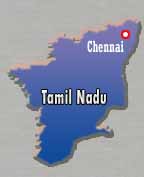India's space programmes based on its needs: Outgoing chief
 Chennai, Oct 31 : India does not look at other Asian countries like Japan and China as competitors in the space sector as its programmes are based on its needs, said Madhavan Nair, who retired Saturday as chairman of the Indian Space Research Organisation (ISRO).
Chennai, Oct 31 : India does not look at other Asian countries like Japan and China as competitors in the space sector as its programmes are based on its needs, said Madhavan Nair, who retired Saturday as chairman of the Indian Space Research Organisation (ISRO).
"Our programmes are based on the practical needs of the people like remote sensing, health and education. India is not looking to compete with any other country in the space sector," Nair told IANS from Thiruvananthapuram on phone.
Nair said: "We have bagged two major orders for building heavy satellites for others. One has been delivered and the other will be shortly delivered."
On the issue of reducing the rocket cost, he said ISRO is testing semi-cryogenic high thrust engines that will use highly-purified form of kerosene and liquid oxygen as fuel.
"The engine will be tested by 2011," he added.
Speaking about the human resource talent availability for ISRO, he said: "The situation will ease with the setting up of our own institute in Kerala."
He said the serious challenge before his successor K. Radhakrishnan is the operationalisation of the indigenous cryogenic stage, and the steps to be taken for the human space flight. "We have to increase the number of launches to five next year."
"Once we stabilise our own cryogenic stage then the payload of our geosynchronous launch vehicle (GSLV) can be increased to 2.5 tonnes. We can also launch two GSLVs in a year."
Looking back at his tenure as the head of ISRO Nair said: "The last six years were highly productive, accomplished several challenging missions including Chandrayaan that discovered water on the moon. The goals set were actualised. There is no unfinished agenda."
As to his post retirement plans he said: "I have not retired. I will continue to offer my services to the country. I am not starting any space consultancy firm."
Queried about India dropping two ranks in the Space Competitive Index, according to a study by Futron Corporation, an American space consultancy company, Nair said: "The US space agency's annual budget is $20 billion as against our budget of $1 billion. What we are getting out of that investment is considerable."
He added: "In the commercial space launch market, geo-political forces come into play. Nevertheless during the last two years ISRO has launched sizeable number of satellites for others."
Futron's 2009 Space Competitive Index (SCI) has ranked India at seventh place with a score of 15.34 points, as against 17.51 points in 2008.
India is ranked below the US (SCI score 90.33 points), Europe (46.80), Russia (32.44), Japan (21.16), China (19.46) and Canada (18.13), and above South Korea (12.03), Israel (8.70) and Brazil (7.08).
Futron ranked the ten nations involved in the space industry on aspects like the government's support to space programmes, the human capital available and the contribution of the private sector to the country's space activities. (IANS)